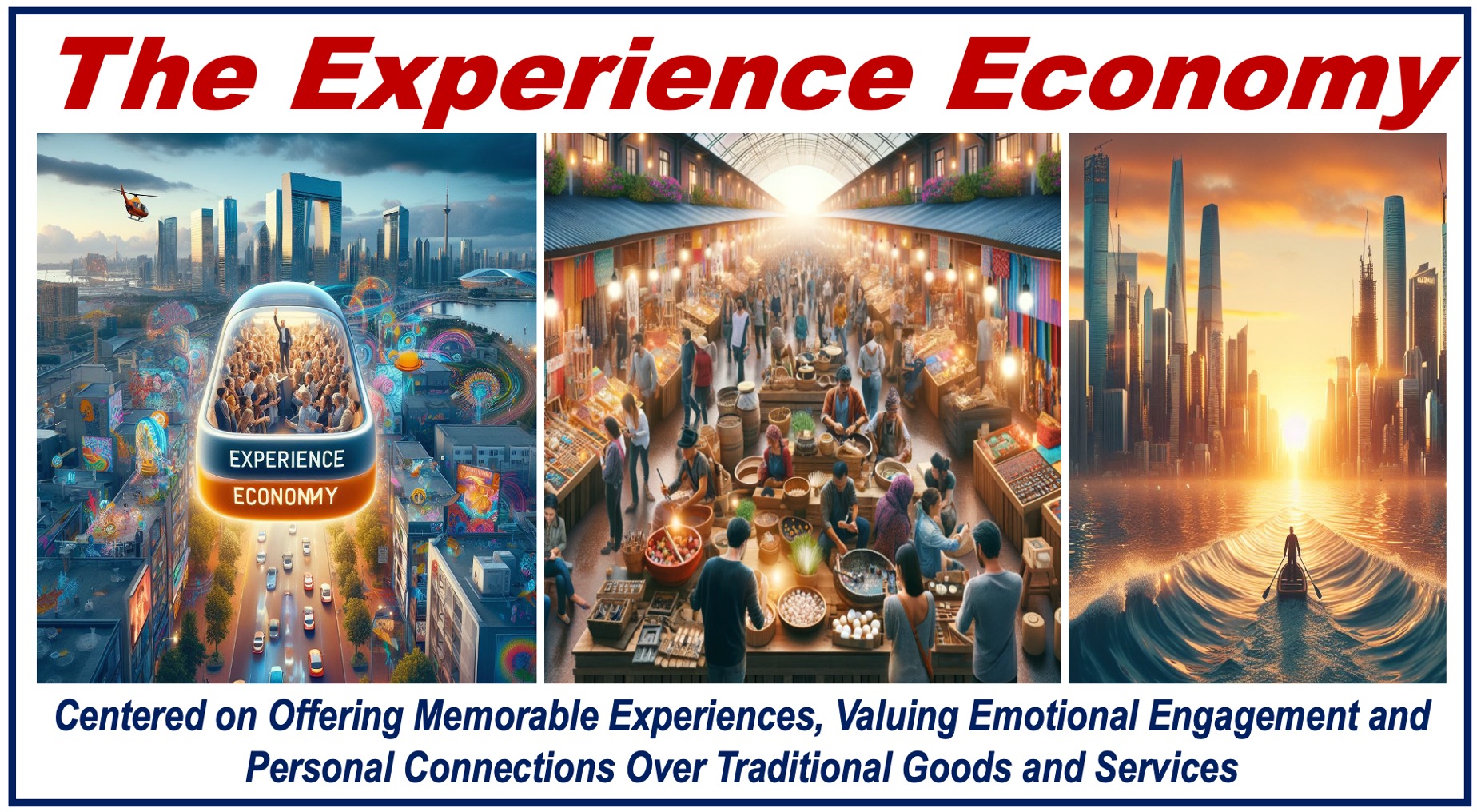If you are selling memorable experiences rather than simply products or services, you are involved in the Experience Economy.
In today’s fast-evolving, fiercely competitive marketplace, many companies are no longer selling just goods or services. A new concept has emerged, and we call it the experience economy.
It is fundamentally changing how businesses operate and how consumers spend their money. It is a market where the primary focus is on providing memorable experiences.
Promoters of memorable experiences say that consumers are willing to pay more for experiences that offer personalization, emotional engagement, and lasting memories.
This shift in consumer preferences marks a major departure from traditional economic models that focus on physical products and standard services.
The Cambridge Dictionary says the following about the experience economy and offers an example sentence containing the term:
“An economy in which many goods or services are sold by emphasizing the effect they can have on people’s lives. Example Sentence: ‘Corporate gurus claim we are moving into the experience economy.'”
The experience economy is gaining traction
Why is the experience economy becoming increasingly more popular? Let’s have a look at some of the factors that contribute to its rise:
-
Technological advancements
Thanks to technology today, it is easier for businesses to create immersive and personalized experiences. Artificial intelligence, machine learning, and many new software programs can offer customers experiences that are highly customized and interactive.
-
Social media
Social media platforms enable us to share our experiences with a wider audience, which further increases the value of unique experiences.
- Consumer preferences
There has been a cultural shift among younger generations towards valuing experiences over material possessions. This has helped the rapid growth of the experience economy.
- Economic prosperity
Rising incomes and living standards in many parts of the world mean that more consumers can spend money on experiences.
- Search for authenticity
In a world of digital and mass-produced goods, consumers are increasingly seeking out authentic, genuine experiences that offer a sense of connection and uniqueness.

Memorable experiences – some examples
Below, you can see how some businesses operate in the experience economy:
-
Disney Park
Immersive worlds where guests live their favorite stories, transcending typical amusement park visits.
-
Airbnb Experience
Offers unique activities led by locals, turning travel into personalized, unforgettable adventures.
-
Escape Rooms
Interactive puzzle rooms challenge teams to solve mysteries, turning problem-solving into entertainment.
-
Lush Cosmetics
In-store, hands-on demonstrations of ethically sourced, handmade products elevate shopping to sensory experience.
-
Peloton
Combines high-end home exercise equipment with live streaming and on-demand classes for an immersive fitness journey.
-
Farm-to-Table Restaurants
Diners experience fresh, local ingredients through stories of origin and preparation, enhancing the culinary experience.
-
Virtual Reality (VR) Arcades
Offers digital realms for gaming, education, and social interaction, making the virtual world tangible.
-
Apple Stores
Provides a hands-on tech discovery zone, where product interaction and expert assistance blend into an educational retail experience.
-
Starbucks
Not just selling coffee but an ambiance; a third place between work and home where personalized service and community feel make every visit unique.
Many industries embracing the experience economy
Many industries, from tourism and entertainment to retail and education have been impacted by the experience economy.
Theme parks and experiential museums, for example, design their attractions that offer not just a visit but an unforgettable journey.
Retailers are offering personalized shopping experiences, workshops, and events that go far beyond the act of purchasing. They are transforming shopping into an experience.
Customer engagement
The most successful companies in the experience economy have one thing in common. They understand that customer engagement is key. They try to create an emotional connection with their customers by personalizing their offerings.
Apart from boosting customer loyalty, this approach also encourages word-of-mouth promotion, which in today’s market is priceless.
Conclusion
The experience economy represents a dramatic shift in consumer behavior and business strategy. Companies that want to succeed in providing their customers with memorable experiences must adapt to this evolving landscape by focusing on innovation, personalization, and engagement.
As technology continues evolving apace, one wonders what the experience economy will be like twenty or thirty years from now.
